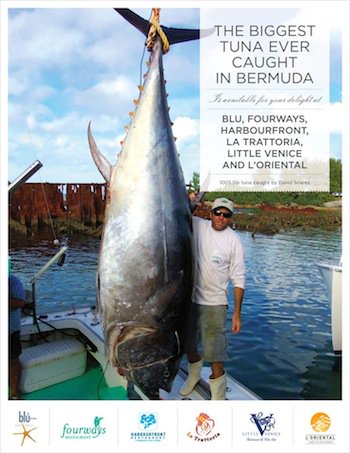David Soares knew he had hooked a big one when his line practically vanished. It was around 10 a.m. on Dec. 22, 2013. He was trolling for wahoo and yellowfin tuna on Challenger Banks about 12 miles southwest of Bermuda when 950 yards of a 1,000-yard reel was gone in seconds.
It wasn’t just a big one. It was the big one. After the fish took him two miles in reverse and fought a "straight up and down battle” for two hours, Soares reeled in a bluefin tuna weighing 1,003 pounds, gutted and gilled. It was the biggest one ever caught in Bermuda, said Soares.
“Right away, when anything takes that much line off a reel that fast, I realized he was quite large,” said Soares. “I’ve never had them take it that fast or that much. I’ve had them take 400 or 500.”
For the two-hour battle, Soares said his reel was set at its maximum drag of 55 pounds and at low speed for a slow and steady pull-in.
About halfway through, the fish dashed away with 400 yards of line. But Soares, who caught the big bluefin single-handedly, persisted. When finally the fish was about 10 to 12 yards away, he harpooned it and brought it in.
Once you learn more about Soares, the monster catch is an achievement but not a surprise. At 43, the third-generation commercial fisherman has been fishing from Bermuda for 25 years. His grandfather was the island’s last whaler and last person to build and sail a trade schooner. Soares has caught four of the 10 bluefin tuna landed in Bermuda, which also included a 630-pounder in November 2009 and a pair on the same day — weighing 403 pounds and 395 pounds — in February of 2012.
When I talked to him last week he was stateside at Platypus Marine in Port Angeles, Wash., which is building him a 55-foot power catamaran for personal use. He and his wife plan to make its first journey to Southeast Alaska toward the end of this summer when the salmon fishing is hot (and fishermen love to fish on their vacations).
Soares fishes year-round from his Central Marine 44-footer, which was built in 2003 on Prince Edward Island, mostly trolling for yellowfin tuna and wahoo with some longlining for swordfish. He said of the small island’s 65,000 population, there are about 150 full-time fishermen and lobstermen. There’s a handful like Soares who go out each morning alone and are back in time to sell their catches directly to hotels and restaurants.
“There’s no fishhouses in Bermuda,” Soares explained. “We go out and catch the fish and we sell off the fish directly to them, tell them what we have and they tell us what they want and then we sell it off piece by piece.”
He told me he had a personal goal to catch a tuna more than 1,000 pounds on his own. “The way I truly wanted to do it was by myself, that’s the way I’ve been fishing for the last 15 years now… this is the way I really wanted it to happen.”
He sold the bluefin to the restaurant company MEF, which distributed the fish to the restaurants it owns (those are listed on the promotional poster of Soares with his fish).
At National Fisherman, we talk to fishermen on all coasts about the concerns surrounding their fisheries. But when I asked if commercial fishermen in Bermuda were facing any troubling issues, he had nothing for me. “Life’s good. It’s sunny, nice weather, average temperature 70, 72. In the dead of winter you might get down 60 to 65.”
He’s clearly passionate about life on the water. Soares tells me he jumps out of bed in the morning ready to go fishing. “The true fishermen fish for the love and the passion of fishing, they don’t fish for the money,” he said.
Life is good.







